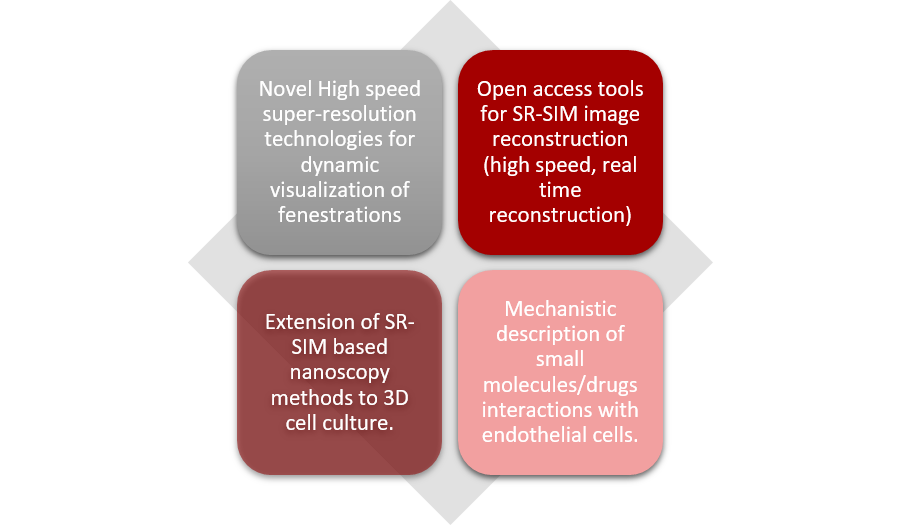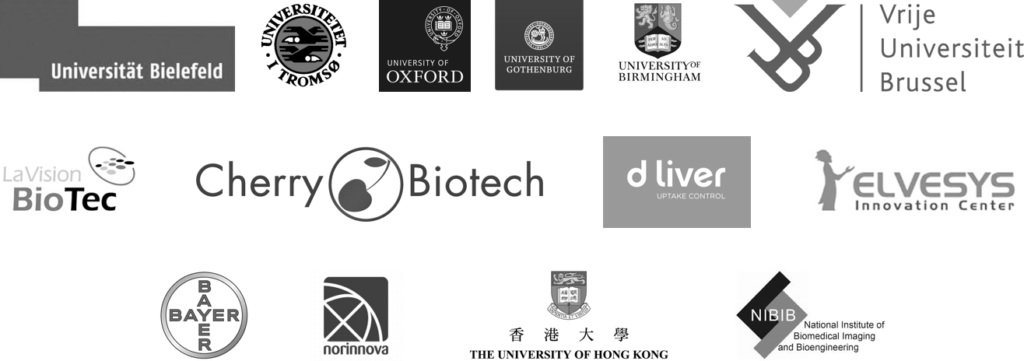DeLIVER : a European training network focusing on nanoscopy
DeLIVER is a training program dedicated to early stage researchers, for the development & application of high speed, high resolution imaging tools for biomedical research. The project aims at studying the function and dynamics of the nanosized pores of liver endothelial cells, currently below the optical diffraction limit. With both academic and private partners, of which 4 SMEs, DeLIVER offers the opportunity to acquire highly valuable skills in physics and biomedical sciences, strongly valuable for the ERS’s career development.
 Dr. Thomas Guérinier
Dr. Thomas Guérinier
CO-FOUNDER & CSO
 Dr. Pierre Gaudriault
Dr. Pierre Gaudriault
R&D RESPONSIBLE
 Position available soon!
Position available soon!
ESR (PHD STUDENT)
A PhD project will soon be opened! CONTACT US to apply.
Aims of DeLIVER and Cherry’s roles as beneficiary
Context
DeLIVER will train a new generation of ESRs (early-stage researchers) in the development and application of new high speed and high resolution imaging tools in biomedical research, to reveal for the first time the function and dynamics of nanosized pores in endothelial cells (EC) that present the main barrier between the blood and vital organs for human physiology.
Beyond the resolution limit: Super resolution-Structural Illumination Microscopy
Super resolution-Structural Illumination Microscopy (SR-SIM) raised a strong interest among biomedical scientists: from the biomedical point of view, this imaging technique offers valuable benefits such as a non restrictive sample preparation, and a twice higher resolution on a sample prepared for widefield resolution spectroscopy. For physicists, the main advantage is that the construction of a super-resolved image is accessible with a slight increase of raw images. The combination of these benefits makes the SR-SIM a suitable technique for live cell imaging, and a promising tool for high resolution tissue observation. DeLIVER aims at extending the knowledge area of SR-SIM, and at developing new applications of this technique for biomedical applications. As it is one of the most difficult mammalian organ to image, the liver and especially its endothelial fenestrations, will be the main focus of the project: the dynamic physiological function of these pores has never been imaged or followed in vivo, and very little is known about the extremely important physiological function of these unique structures.

Key research objectives of the program.
A training program tailored for ESRs’ career development
The scientific core of DeLIVER consists in four complementary, multidisciplinary work packages that will be run simultaneously. Fourteen ESRs will be cross-pollinated with concepts and skills in physics and biomedicine, optical nanoscopy, analytical image reconstruction, and optical micro-manipulation methods. The scientific part is completed with network coordination, management, ESR training and career development, dissemination and communication. As the DeLIVER consortium includes both academic and private partners, the ESR will be exposed to both academic and non-academic environments, aggregating a strong expertise in cutting edge technology and nurturing entrepreneurship mindset. The main training aspects are:
- To produce a cohort of 14 PhD graduates each with a high level of scientific expertise, plus transferable skills from compulsory courses in English, entrepreneurship, grant/bid writing, communication and project management.
- To encourage and enable the ESRs to be leading players in cutting-edge research projects with research related skills in cutting edge optical methods.
- To nurture entrepreneurial skills needed to play leading roles in converting knowledge and ideas into innovative new products and services through exposure to SME environments as well as a global player in the pharmaceutical industry.
- To produce well-rounded professionals with an expansive portfolio of transferrable skills, which enable them to solve problems and manage projects independently, resulting in a wide perspective of potential career paths in the European market place.
- To create an active ESR network.
The H2020-MSCA-ITN-DeLIVER consortium
The DeLIVER consortium is composed of 10 participants, of which 6 academic ones and 4 SME, located in Germany, Sweden, Norway, France, Belgium, and United Kingdom. Plus, partner organization come to enrich the consortium : Bayer AG (Germany), Norinnova (Norway), Center for Education & Research on Ageing (Australia), The University of Hong Kong (China), NIBIB (USA).

